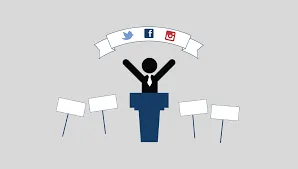The Growing Role of Media in Politics and Campaigns
The media has been integral in politics and political campaigns since the advent of television. From televised debates to political advertisements, the media has played an ever-growing role in influencing voters and shaping public opinion. This is especially true in the digital age, where political campaigns rely heavily on social media, online video, and other digital tactics to reach the public.
We will explore the growing role of media in politics and campaigns and discuss how this has changed the way campaigns are conducted. We will also look at the potential implications of this trend for democracy and the public discourse.
How Social Media is Changing the Game for Political Candidates
In today’s day and age, social media has become an integral part of running a political campaign. It has changed the way in which candidates interact with their constituents, the public, and the media. Social media allows political candidates to reach a much larger audience and to engage in direct communication with their supporters.
Social media allows political candidates to quickly and easily disseminate their message and to interact with their supporters in a much more personal and direct way than before. This helps to build stronger relationships between the candidate and their supporters, which can result in increased voter turnout at the polls. Candidates can also use social media to counter statements made by their opponents or to respond quickly to events that occur during the campaign.

Social media can also be used to more effectively target the right audience for a political campaign. For example, candidates can use social media to target specific demographics or geographic areas that may be key to winning an election. This can help to increase the efficiency of a political campaign by focusing resources on those areas where it will be most effective.
In addition to increasing efficiency, social media can also help to increase transparency in a political campaign. By engaging in direct communication with their supporters, candidates can provide an inside look into their campaign and address questions or concerns in real time. This can help to build trust between the candidate and their supporters, which can result in increased voter turnout at the polls.
Overall, social media has changed the game for political candidates by allowing them to reach a larger audience, interact with their supporters in a more direct manner, and target specific demographics or geographic areas. By using social media strategically, candidates can increase the efficiency of their campaigns and build trust with their supporters, which can result in increased voter turnout at the polls.
Exploring the Benefits of Digital Media for Political Outreach
Digital media has revolutionized the way that political outreach is conducted. With the rise of the internet and social media platforms, politicians have unprecedented access to potential voters. Digital media has enabled politicians to reach previously untapped audiences with the click of a mouse.
For politicians, digital media is an invaluable tool for connecting with voters. By having a presence on social media, politicians can tailor their message to different audiences. For example, they can target specific demographics, such as age, gender, or location. This allows politicians to speak directly to those constituents and have meaningful conversations. It also allows them to build relationships with potential voters in a way that wasn’t possible before.
Digital media also provides politicians with a platform for disseminating their message. Through websites, blogs, and social media accounts, politicians can easily share their thoughts with the public. This can be especially useful during election season, when they can use digital media to reach a vast number of people.

In addition to being an effective communication tool, digital media can also be used to raise funds for political campaigns. Politicians can use their digital presence to solicit donations from potential donors. This is especially helpful for candidates who don’t have the resources to conduct traditional fundraising activities.
Finally, digital media can be used to spread political awareness. By using social media, politicians can reach a wide variety of people and inform them about important issues. This can help increase voter turnout and engagement in the political process.
Digital media has revolutionized the way that political outreach is conducted. It provides politicians with a powerful tool for connecting with potential voters, disseminating their message, raising funds, and increasing political awareness. As a result, it has become an invaluable asset for politicians.
The Power of Targeted Ads in Political Campaigns
Political campaigns have become increasingly reliant on targeted ads in order to effectively reach their target audiences. Targeted ads have been proven to be a powerful tool for political campaigns, allowing them to target specific demographics and individuals with tailored messages.

Targeted ads allow political campaigns to segment and target voters based on their demographic and political data. Political campaigns can use this data to create ads that are tailored to their target audiences. For example, a campaign might target ads to voters who are likely to support their candidate, or to those who have certain political beliefs. This allows campaigns to effectively target their messages and reach voters who are the most likely to respond.
Targeted ads also allow campaigns to measure their success. By tracking which ads are viewed and shared, campaigns can determine which ads are most effective. This allows them to further refine and refine their messaging in order to maximize their impact.
The ability to target specific voters also allows campaigns to better target their resources. By focusing on the voters most likely to support their candidate, campaigns can make the most of their limited resources. This has the potential to significantly increase the effectiveness of campaigns, allowing them to get the most out of their efforts.
In short, targeted ads are an incredibly powerful tool for political campaigns. By targeting specific demographics and tracking the success of their campaigns, campaigns can maximize their impact and ensure that their message reaches the right people.
Understanding the Growing Role of Video Content in Political Campaigns
Political campaigns are increasingly relying on video content to engage with their target audiences and communicate their messages. This growing reliance on video content reflects the changing landscape of political communication.
In the past, political campaigns relied primarily on traditional media, such as television ads, radio spots, and print materials, to reach their target audiences. However, in recent years, video content has become increasingly popular as a means of connecting with voters. This is due in part to the rise of digital platforms, such as social media, that allow campaigns to reach a wider range of people with their messaging.
Video content offers campaigns the opportunity to engage with their audiences in more dynamic and creative ways. Videos can be used to tell stories, explain complex issues in an accessible way, and showcase the candidate’s personality. They can also be used to create an emotional connection with viewers, which is often an important factor in persuading voters.
Political campaigns are also using videos to reach younger voters, who are more likely to watch videos than other forms of media. Videos can be used to highlight relevant issues for younger audiences, such as student debt or climate change, in ways that are engaging and relatable.
Overall, video content has become an essential tool for political campaigns, offering a versatile and effective way to reach and engage with their target audiences. As campaigns continue to embrace the power of video, it’s likely that its role in political communication will only continue to grow.
How Political Candidates are Leveraging Mobile Devices to Reach Voters
With the development of technology, the way political candidates communicate with voters has changed significantly. Mobile devices are now the preferred way to reach voters, and many candidates are leveraging them to their advantage.
Mobile devices offer a range of opportunities for political candidates to engage with voters. From text messages to mobile apps, candidates can send targeted messages to potential voters and keep them informed on their campaigns. They can also use mobile devices to run polls and surveys to gauge public opinion on various issues.

Social media is another powerful tool for political candidates. With platforms like Twitter and Facebook, candidates can quickly spread their message and reach a wider audience. They can also use these channels to post updates and interact with voters in real time.
In addition, mobile devices can make it easier for candidates to engage with voters. For instance, candidates can use mobile devices to organize events, such as town hall meetings and rallies. This allows them to interact with voters in person and better understand their needs and concerns.
Finally, mobile devices are also a great way to collect donations from supporters. Through mobile payment platforms, candidates can quickly and easily collect donations from anywhere in the world.
Overall, mobile devices are becoming an increasingly important tool for political candidates. By leveraging them, candidates can more effectively engage with voters, spread their message, and collect donations.
The Impact of Online Ads on Political Fundraising Strategies
The role of online ads in political fundraising strategies has become increasingly important in today’s digital world. With the rise of social media and other online platforms, campaigns are now able to reach a wider audience with their fundraising messages. This has been a particularly useful tool for smaller campaigns that may not have the resources to invest heavily in traditional methods of fundraising such as television and radio spots.
The most important benefit of online ads for political fundraising is the ability to target potential donors more precisely. With online ads, campaigns can target potential donors by demographics, interests, location, and other factors. This allows campaigns to send fundraising messages to the people most likely to be interested in their cause, thereby maximizing the return on investment of each ad.
Online ads provide campaigns with the ability to track user engagement with their messages. Through analytics, campaigns can measure the success of each ad and adjust their strategy accordingly. This allows campaigns to determine what messages resonate with their target audience and hone their fundraising efforts for maximum impact.
Finally, online ads are often less expensive than traditional methods of political fundraising. With the ability to target their message to specific audiences, campaigns can often obtain better results for a fraction of the cost of traditional methods. This offers campaigns a cost-effective way to reach potential donors without breaking the bank.
The role of media in politics and political campaigns has grown significantly in recent years. Through the use of social media, television, radio, and other digital platforms, politicians are able to create campaigns that reach a much wider audience than ever before. As technology continues to advance, the importance of media in political campaigns will only increase. It is important for political candidates to understand the power of media, and to use it effectively in order to win elections and gain public support.